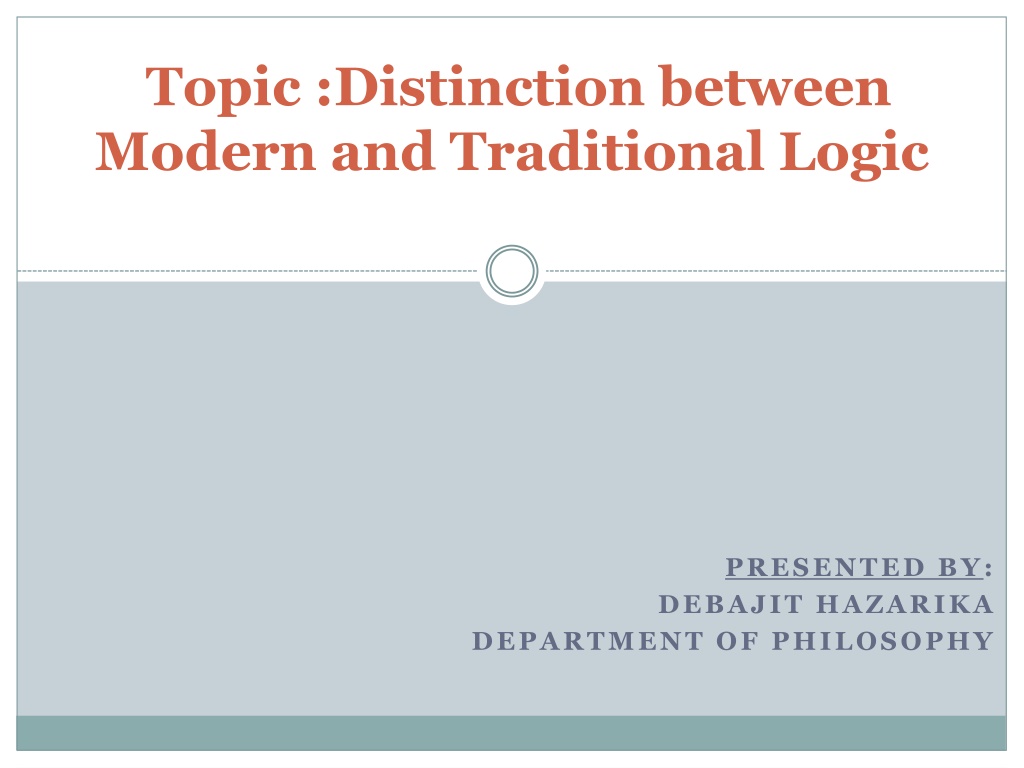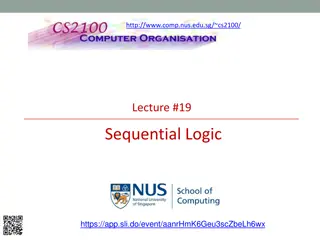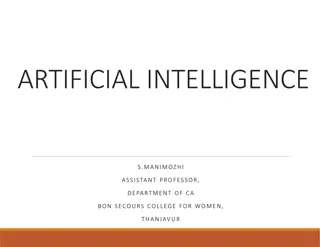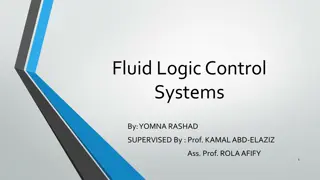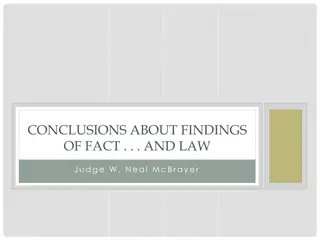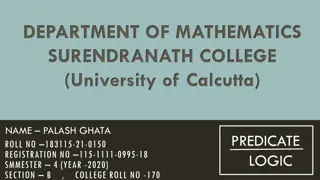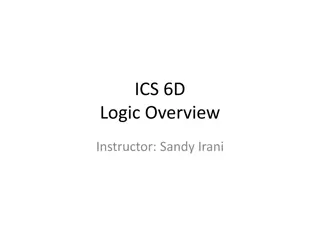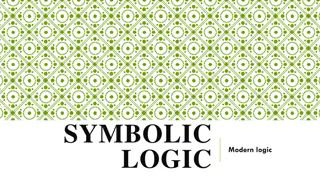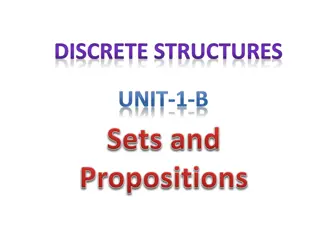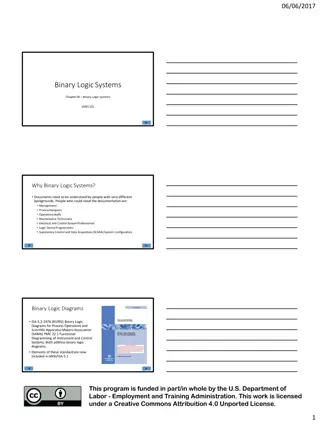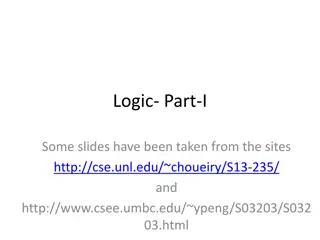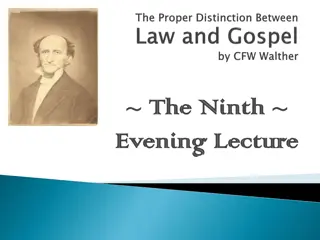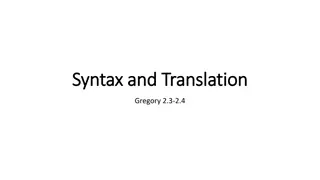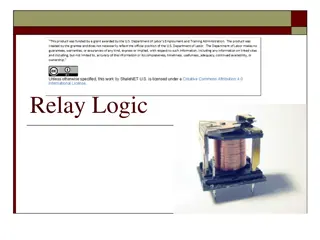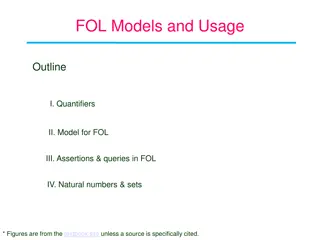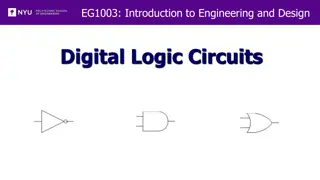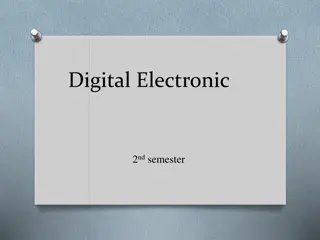Topic : Distinction between Modern and Traditional Logic.
Logic, as a normative study, focuses on distinguishing correct reasoning from incorrect. Traditional logic, based on Aristotle's work, emphasized syllogistic reasoning, while modern logic, pioneered by figures like Leibnitz and Russell, employs mathematical methods and symbolic logic for a more advanced approach. Key distinctions include the historical timeline, symbolic usage, deductive methods, and the analysis and classification of propositions.
Download Presentation

Please find below an Image/Link to download the presentation.
The content on the website is provided AS IS for your information and personal use only. It may not be sold, licensed, or shared on other websites without obtaining consent from the author. Download presentation by click this link. If you encounter any issues during the download, it is possible that the publisher has removed the file from their server.
E N D
Presentation Transcript
Topic :Distinction between Modern and Traditional Logic PRESENTED BY: DEBAJIT HAZARIKA DEPARTMENT OF PHILOSOPHY
INTRODUCTION INTRODUCTION From the etymological point of view logic is the science of thought as expressed in language. All our thinking expressed in language, but logic doesn t deal with all our thinking, only with reasoning. We can understand the concept of logic, by means of I.M. Copy s view point: Logic is the study of the methods and principles used to distinguish correct (good) from incorrect(bad) reasoning. So, logic is a normative study, which formulates certain principles of correct reasoning.
A BRIEF CONCEPT OF TRADITIONAL AND MODERN LOGIC: By means of Traditional logic, we mean the system of logic founded by the famous Greek philosopher Aristotle(384 to 322 B.C.). This system is known as also Aristotelian logic and classical logic. It was less limited to the type of syllogistic reasoning. It demands further improvement and development of logic. Modern logic is a later phase in the development of logic. By the mathematical methods, principles and techniques the pioneers of modern logic develop this phase. Modern logic is known as symbolic logic, where symbols are used in a wide sense for expressing, formulating and verify the Arguments and to determine their value in a better and easier way. Pioneers of modern logic were G.W. von Leibnitz, Augustus de Morgan, W.S. Jevons, John Venn, C.S. Peirce, Gotlob Frege ,George Boole, Bertrand Russell, Whitehead,Quine etc.
Distinction between Modern and Traditional Logic Modern logic Traditional logic 1.Modern logic has a short history as it is only about one hundred and fifty years old. 2.But in symbolic logic symbols are used extensively. 3. C.I. Lewis pointed out the use of deductive method as one of the basic characteristics of symbolic logic. Symbolic logicians have used this method more extensively and more thoroughly. Modern logic also use mathematical methods in wide sense. Regarding the history: Classical logic has a long history A history about two thousand and three hundred years. Regarding the use of symbols: In classical logic symbols were used to a limited extent Regarding the use of methods: Deductive method was used by classical logic in limited sense. 1. 2. 3.
4. Regarding the analysis of proposition: The classical logicians regarded the categorical proposition to be the model type of proposition and wanted to reduce all other types of proposition to this categorical proposition. Moreover in classical logic every categorical proposition is regarded to be the statement of a certain relation between two terms. 4.Modern logic cancels such a narrow analysis of proposition. In modern analysis a proposition need not be two termed proposition
5.Regarding the classification of proposition: The classical logic classified propositions regarding to Structure: Simple and Compound Proposition. Classical Logic also divided propositions regarding to : i) Quality :-Affirmative and Negative proposition, ii) Quantity :- Universal and Particular proposition iii) Relation :- Categorical and Conditional proposition iv) Significance: Synthetic and Analytic proposition v)Modality: Necessary, Assertory and Problematic Proposition. 5.Modern logicians classify proposition into: i) Simple proposition:-(subject- predicate, subject less, relational and class-membership proposition) ii) Compound proposition:- (conjunctive, Implicative, disjunctive and alternative proposition) iii) General proposition: (Existential, one-predicate universal proposition and general proposition asserting relation between classes)
6. Regarding the relation: The classical Treatment of relation is extremely unsatisfactory because classical logicians recognized only one kind of relation between the subject and the predicate. i.e. the relation of predication. Again classical logicians thought that the copula alone is capable of expressing all type of relations. 6. But modern logicians think that the copula of classical logic is not capable of expressing all types of relations. Classical logicians over burdened the copula while modern logicians recognize only a limited functions of it. Modern logicians recognize various types of relations such as Transitive, Non- transitive Symmetry,Non- symmetry etc.
7.Regarding the scope: Classical logic is narrower in scope than modern logic. It is more or less confined to the logic of syllogism. It is not capable of dealing with all forms of argument. 7. Symbolic logic has a very wide scope as it is capable of dealing with variety of argument forms. There are certain branches in modern logic which are conclusively designed to deal with special types of arguments. Some of these branches are propositional logic and predicate logic.
CONCLUSION Observing the nature of differences between classical logic and symbolic logic it can safely be said that though both these two system differ in certain important respects mentioned above the relation between them is not the relation of antagonism. They are closely related to each other because both these two systems are concerned with form and validity of arguments. Both are formal and deductive in nature. Classical or traditional logic and symbolic logic are not two unconnected systems mutually exclusive to each other. Symbolic logic is only an improvement upon classical logic. The difference between these two systems are only the difference of different stage of development-the difference is the difference of degree and not of kind, though the difference of degree is tremendous. Thus, it can be concluded that the relation between classical and symbolic logic is just like the relation between the seed of a banyan tree and its full grown form. In the word s of A. H. Basson and D.G.O. Connor, The classical logic is related to symbolic logic as embryo to adult organism .
